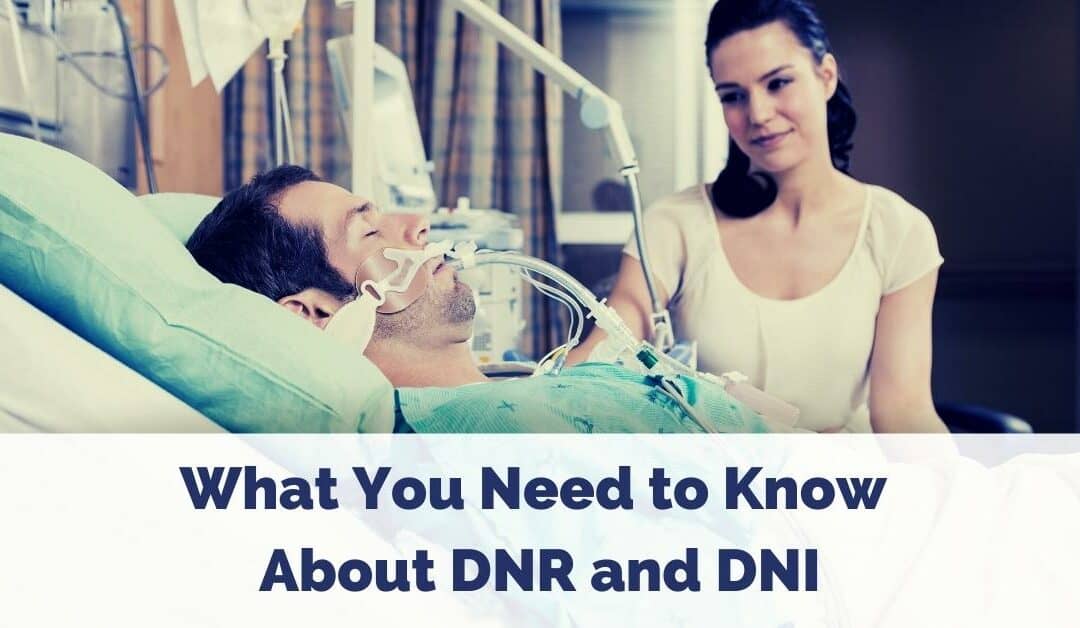If you’re like most people, the idea of being resuscitated in the event of a heart attack or other medical emergency is pretty frightening. That’s why it’s essential to understand your options when it comes to advance directives for healthcare. Let’s look at DNR and DNI meanings and explain why they may or may not be the best advance directives for you.
What is an Advance Directive?
An advance directive is a legal document that allows you to state your wishes regarding medical treatment if you cannot communicate those wishes yourself. Advance directives can include DNR, meaning “Do Not Resuscitate,” and DNI, meaning “Do Not Intubate.”
Other common Advance Directives include:
- dialysis
- chemotherapy
- ventilator use
- cardiopulmonary resuscitation (CPR)
- surgery
- organ donation
- pain management
There are two types of Advance Directives:
- Living Will – This is a written document that states what kind of medical care you would or would not want to receive if you were terminally ill or in a permanent vegetative state.
- Medical Power of Attorney – This is a written document that designates another person (called your “agent” or “proxy”) to make medical decisions on your behalf if you are unable to do so yourself.
In North Carolina, an Advance Directive must be:
- In writing
- Signed and dated by you (the person making the directive)
- Notarized
- You can revoke your Advance Directive at any time by simply destroying the document or telling your health care providers that you have changed your mind.
Why Would I Need an Advance Directive?
An Advance Directive comes into play when you can no longer make decisions for yourself, either because you are unconscious or you have a terminal illness.
For example, if you are in a car accident and go into a coma, your family will have to make decisions about your care. If you have an Advance Directive, they will know what your wishes are and can ensure your medical team follows your orders.
Another example is if you have a terminal illness and are on life support. If you have an Advance Directive, your family will know whether or not you want life support and ensure that your medical team carries out your wishes.
DNR and DNI Meaning: What is the Difference?
A Do Not Resuscitate (DNR) order is a medical order that instructs health care providers not to do CPR (cardiopulmonary resuscitation) in the event that:
- Your heart stops beating
- You stop breathing
Do Not Intubate (DNI) orders instruct health care providers not to place a tube in your mouth and lungs (called intubation) even if you stop breathing on your own. A DNR order alone will often imply that the patient does not want intubation in some hospitals.
Some quick statistics about intubations:
- 98% of intubations are unrelated to cardiac arrest
- Most intubations are for pneumonia or surgery
- The vast majority of people requiring resuscitation will require intubation (1)
In North Carolina, you must have a separate DNR and DNI order if you do not ever want intubation.
Pros and Cons of Having a DNR or DNI
There are both pros and cons to having a DNR or DNI order. Some people may want a DNR or DNI because they do not want to be kept alive on life support. They may feel that they have lived a whole life and do not want artificial means keeping them alive.
Other people might want a DNR or DNI because they are concerned about the quality of their life after resuscitation. They may not want resuscitation if it means that they will have a long and challenging recovery.
There are also some cons to having a DNR or DNI. Some people may not want a DNR or DNI because they are afraid that they will be left to die if their health deteriorates.
Other people may not want a DNR or DNI because they are worried that their family will make decisions for them and they will not have a say in what happens.
Making the Decision
Deciding to have a DNR or DNI is a personal one. There is no right or wrong answer. You should think about what is important to you and what you would want if you were in a situation where you could not make decisions for yourself.
You should also talk to your family about your wishes. It is crucial to make sure that they know what you want and that they are comfortable with carrying out your wishes.
You should also talk to your doctor about your wishes. They can help you understand the pros and cons of having a DNR or DNI and answer any questions you may have.
If you decide that you want a DNR or DNI, you need to make sure that you write out your wishes. You can do this by working with your estate planning attorney to draw up your advance directives.
We Can Help
At Cape Fear Law, our estate planning attorneys work with you to ensure your medical team respects your desires. We can help you draw up your advance directives and ensure that they stand up to legal scrutiny. Contact us today to schedule a consultation and find out how we can help.

